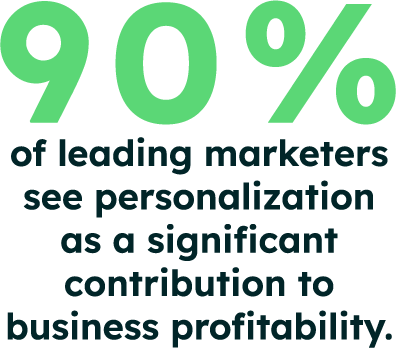Today’s marketing can seem like everybody is trying to get noticed and get their sales no matter what. In a climate of annoying and pushy messages that inspire people to develop new iterations of banner blindness, what really matters—real, human interaction—can feel like a lost art. This hits harder in healthcare, where trust and care mean more than in other businesses. Hospitals, usually armed with solid branding strategies and big marketing plans, should be particularly aware of that. Yet, something crucial is often missing.
That something is personalization. You may call your patients by name in your emails, which is good practice. But there’s more than that—it’s about uncovering your patients’ unique needs and feelings to craft your marketing strategies that directly address them. Traditional branding is still important, but the central place in digital marketing for hospitals now belongs to patient-centric care based on personalized content and more direct interactions.
You’ve Heard About B2B and B2C, but What About H2H?
It’s just a coincidence if those acronyms remind you of chemical formulas. Business-to-business (B2B) and business-to-consumer (B2C) are marketing strategies widely used in market segmentation and targeting. However, the rise of aggressive sale-oriented digital practices forced the development of a new concept that aims for a more natural connection.
Human-to-human (H2H) marketing goes beyond usual marketing tactics to reveal the core of any business: genuine human interaction and empathy. Let’s be honest – many large medical systems like hospitals often see patients as numbers in databases. This strategy fights that—it treats patients as individuals with stories, fears, and hopes. It’s critical for the success of digital marketing for hospitals since patients often experience vulnerability and anxiety throughout their healthcare journey. Thus, a marketing approach that addresses these emotions can significantly enhance patient engagement and trust.
You might think that H2H is just another buzzword in the neverending marketing glossary—but, its benefits tell a different story. The H2H marketing approach helps hospitals build stronger trust and helps potential patients choose healthcare providers that make them feel safe and heard, boosting patient acquisition and improving patient satisfaction. When there’s more trust, health outcomes get more optimistic. Plus, this strategy can make you stand out in a crowded market by giving patients a more caring and personalized experience.
Bring Your Digital Marketing to Patients
To conduct successful digital marketing for your hospital, you need to do more than show up online and rely on your branding. Patients want to feel heard in the digital space, just like in person. Now that we’ve uncovered the potential of personalization with an H2H approach, let’s explore how you can make it the core of your marketing strategy.
Put Your People in The Spotlight 
Do you know what people truly relate to? It’s stories—especially the real-life ones. This is true across all industries.
The people who deliver the care are at the heart of every hospital’s success. Showing your team’s faces and sharing their stories can help you move past branding and establish a personalized, relatable presence. Sharing their knowledge, success, and the segments of everyday hurdles can strike an emotional chord with patients looking for genuine care.
Authentic content featuring your staff is a valuable strategy in digital marketing for hospitals that can help you stand out online. This approach makes everyone feel more connected and valued, from your team to your patients.
Leverage User-Generated Content (UGC)
The importance of stories for your marketing efforts comes from something other than your side. There is another one, equally important.
User-generated content (UGC) is what people, not brands, create and share online, like a review, photo, or story about using a product or service. Regarding digital marketing for hospitals, such content is of high value. Patients who share their own positive experiences give a layer of trustworthiness to the impact of your care.
Resharing your patient’s impressions is a big plus to your online presence and overall performance. But remember, privacy is key. Some data in your patients’ posts may be considered Protected Health Information (PHI). So, always get consent before sharing their stories to ensure data security and compliance with the Health Insurance Portability and Accountability Act (HIPAA).
Find A Common Language
Have you ever felt lost in talking to lawyers due to their complex legal vocabulary and Latin phrases? That’s how your audience might feel about medical terminology.
In digital marketing for hospitals, ditching the medical jargon for clear, compassionate language makes all the difference. Genuine conversations help build a meaningful rapport with potential patients and address their concerns in a more personal and relatable way. Simply put, your choice of words can make healthcare feel less intimidating and more welcoming, ensuring every patient feels seen and valued.
Your current and potential patients aren’t keen on corporate slang, sales talk, cold medical language, or overly fluffed-up vocabulary. Finding a common language that aligns with your brand’s tone of voice will help you humanize your brand and inspire a personalized perception in the eyes of your audience, resulting in more engagement and meaningful interactions.
 Show That You Care
Show That You Care
In an age where interactions are often reduced to clicks and swipes, showing you genuinely care and strive towards a patient-centric approach can significantly differentiate you from other hospitals. Meeting your audience’s needs and addressing their concerns yields a lot of benefits for your healthcare business too—90% of leading marketers see personalization as a significant contribution to business profitability.
To make the most out of digital marketing for hospitals, you need to make every interaction, online and in-person, feel more individual and caring. Simple things like personalized health tips or a birthday message can make a big difference in how patients see your care. Also, the efficiency and empathy your customer service shows are often the first signs patients use to set their expectations about your quality of care. Make sure your staff is quick to assist in answering simple questions or resolving concerns.
Engage With Your Audience
Successful digital marketing for hospitals relies on real conversations. Making your patients active and equal participants in the conversation is crucial for your patient acquisition and retention.
Use different ways to interact online with your patients. For example, social media holds a huge share of power in healthcare marketing since most people use it for everyday searches and communication. Showing up where your patients are and sharing knowledge through interactive content will help boost your efforts. Another core aspect is your online reputation: people heavily rely on reviews when choosing their provider. Ensure that you address them, whether they’re positive or negative, to show you listen, take feedback, and make improvements to meet your patients’ needs.
Also, creating an inviting and safe online environment where others can talk, share, and support each other is significant for building a wider community. Initiating genuine and informal online interactions can make patients feel more connected and happy with their choices.
Stock Material is So Last Decade. Create Your Own.
A unique visual representation is one of the pillars of successful branding and marketing. Yet stock imagery and generic content are still widely used. Patients can find them repulsive when choosing a healthcare provider.
People value authenticity and relatability. This is even more visible in healthcare, where each marketing element needs to send a message of trust and reliability. So, using stock photos and generic stuff online won’t do your hospital any favors. As we have seen, patients respond to the truth—from being able to peek into the premises and get to know the staff to relying on other patients’ experiences to set their own expectations.
Successful digital marketing for hospitals implies only original content. That is why you should make original photos, graphics, visuals, and organic stories the backbone of your content marketing strategies. This isn’t just nice to have; it’s a way to stand out and truly connect with the people who seek your care.
Are You Ready to Personalize Your Online Presence?
Remember: everything you do is directed towards people. They buy products and services, and your profitability is dependent on them. It doesn’t mean you need to treat your patients just as customers. On the contrary, personalized digital marketing for hospitals makes you more approachable and open to them.
Also, involving personalization in your marketing strategies is not about choosing between an already established brand position and a recent innovative trend. The best results come from blending them into a comprehensive strategic approach that makes your patients happy while driving the profitability of your hospital.
Incorporating a specialized healthcare and HIPAA-compliant marketing platform into your healthcare marketing strategy can help you streamline activities and free up more space for personalization and experimenting. SocialClimb’s healthcare marketing platform offers a range of automated solutions that let you engage with patients through different channels from a single place, streamline reputation management, conduct targeted advertising campaigns, and analyze key performance metrics to maximize your marketing ROI.
Using this platform helps you combine your proven marketing methods with contemporary digital marketing channels and strategies, enabling a high level of personalization and patient engagement.











